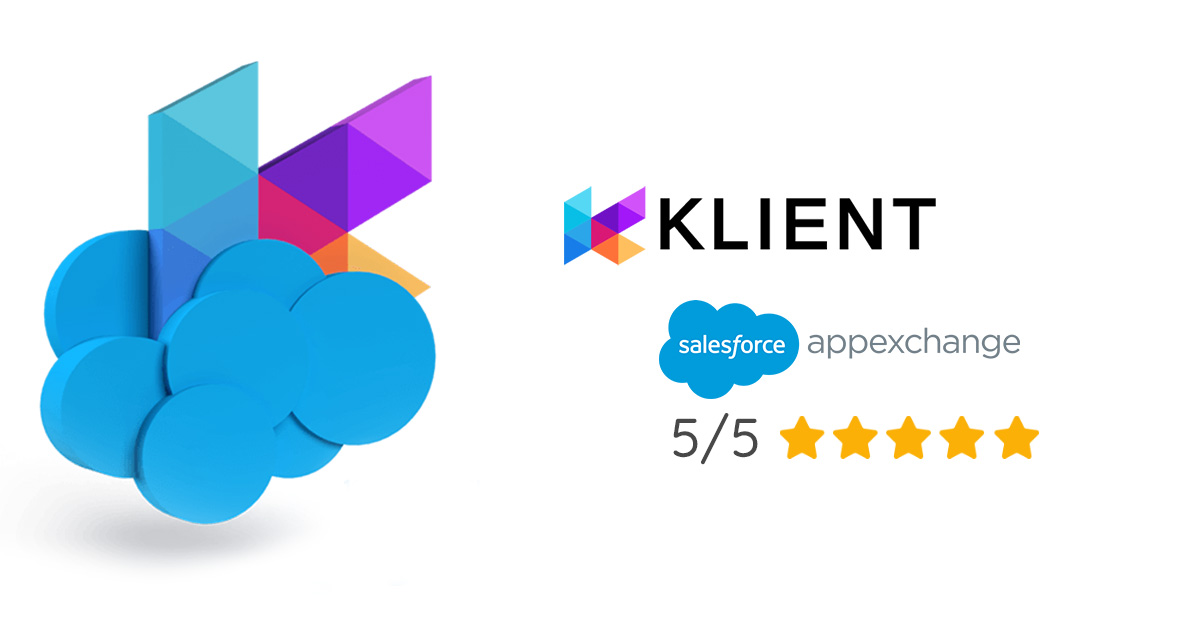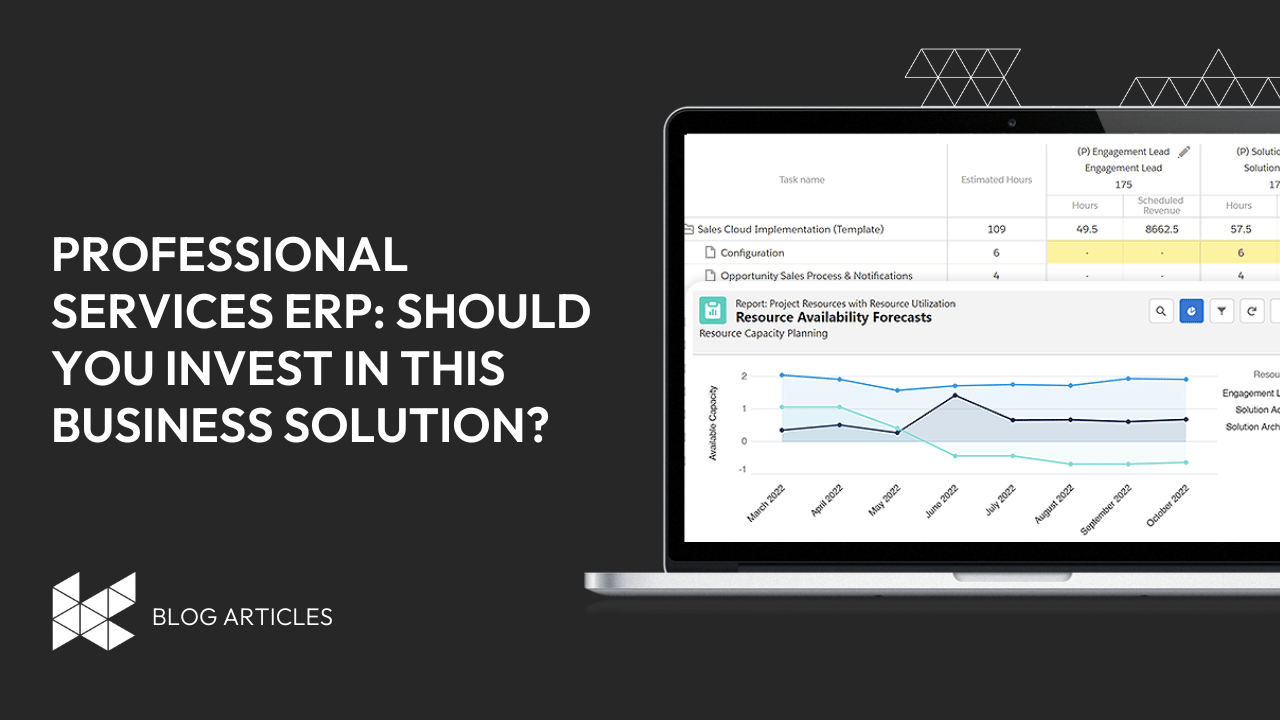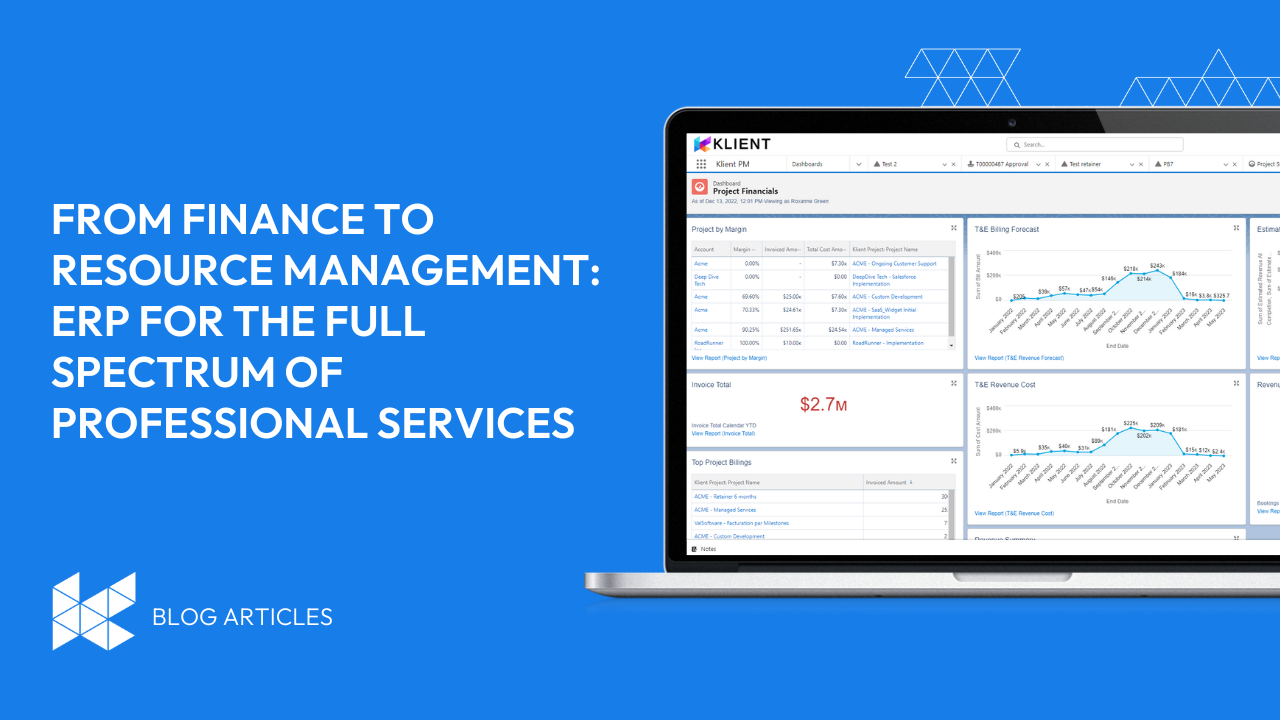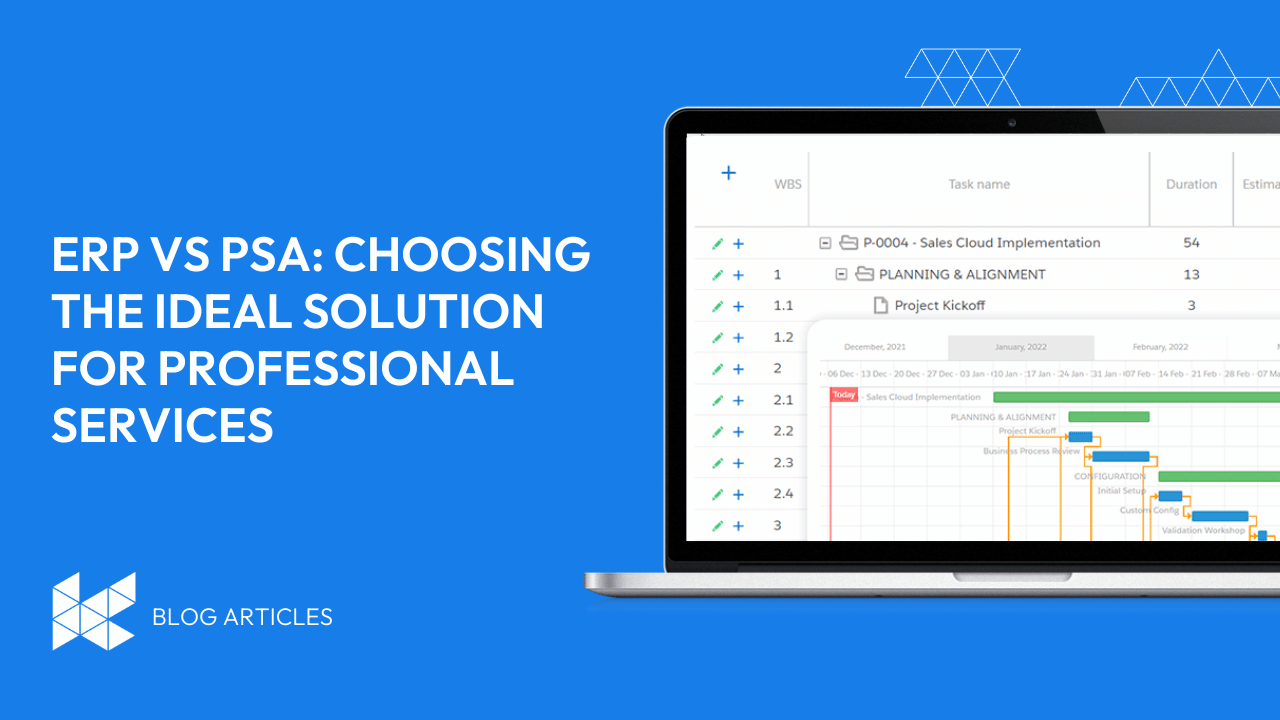
ERP vs PSA: Choosing the Ideal Solution For Professional Services
Enterprise Resource Planning (ERP) and Professional Services Automation (PSA) solutions both offer unique benefits for streamlining operations and driving growth. However, there are some key differences between the two types of solutions. ERP solutions are typically more comprehensive, while PSA solutions are more focused on project management and resource allocation.
To make an informed purchasing decision, you must understand the distinctions between ERP and PSA software.
In this comprehensive guide, we will explore the definitions, benefits, and examples of ERP and PSA software. By examining their similarities and differences, you’ll gain valuable insights into how each solution impacts various aspects of your business processes!
Lastly, we’ll help you make an informed decision that aligns with your long-term goals by assessing your needs, evaluating the available options, and choosing the most appropriate solution for your specific needs.
- What is ERP?
- What is PSA?
- Comparing ERP and PSA
- Choosing the Right Solution for Your Business Needs
- How To Choose The Best PSA For Your Organization
- Frequently Asked Questions About Erp vs Psa
- Wrapping It Up — Have Fun Growing Your Business With Klient PSA
What is ERP?
ERP is a comprehensive set of integrated software applications that allow businesses to effectively manage their core processes. These processes include:
- Finance
- Human resources
- Supply chain management
- Customer relationship management
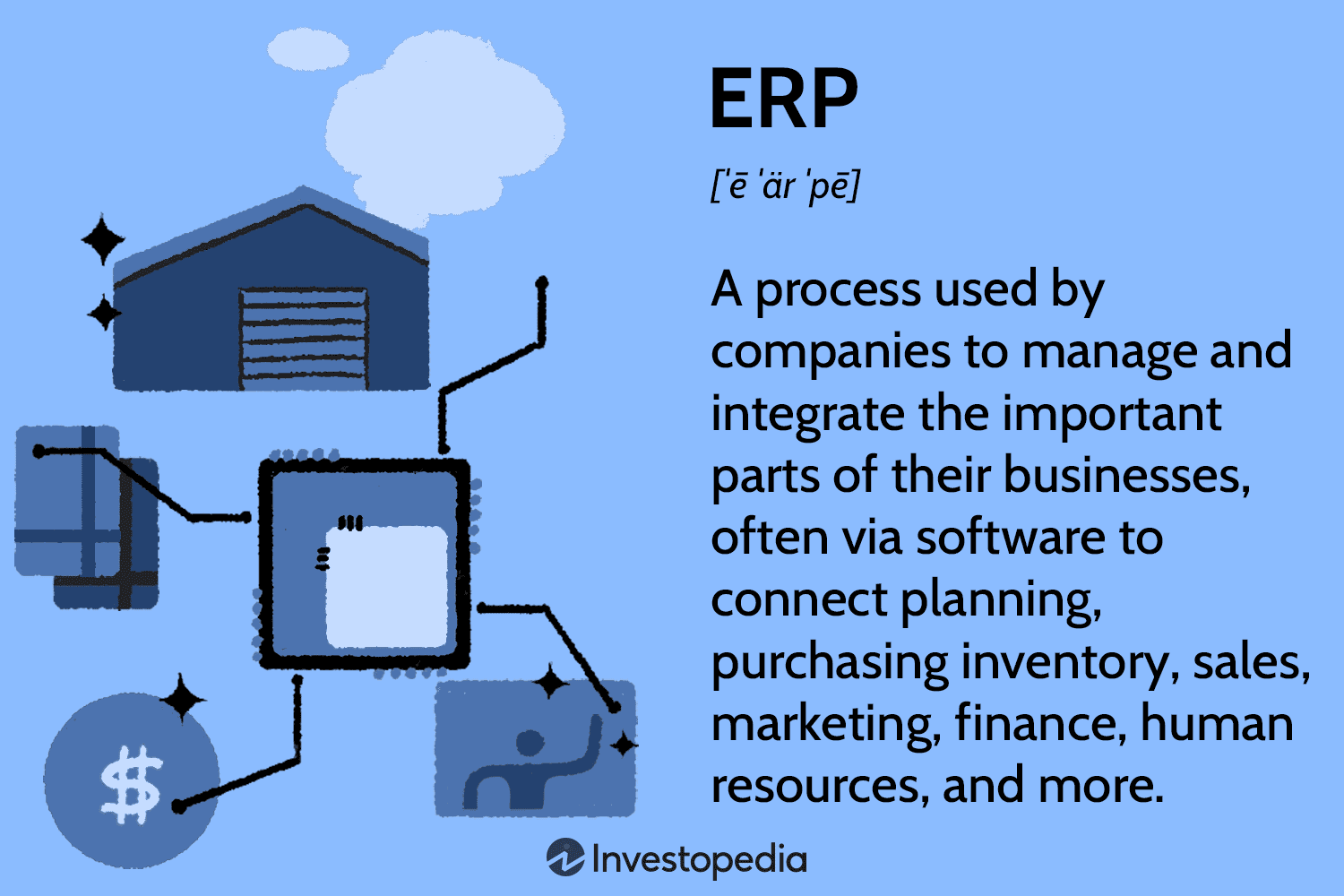
By centralizing data from various departments into a single system, an ERP solution enables organizations to make informed decisions based on real-time information.
Benefits of ERP
Here’s how professional services firms can benefit from implementing an ERP solution:
- Better decision-making: With access to real-time data across multiple departments in one centralized location, leaders can make more informed decisions about resource allocation and strategy development. Data-driven organizations can outperform their competitors by 6% in profitability and 5% in productivity, according to PwC.
- Increase operational efficiency: Automating manual tasks like data entry helps reduce errors and save time spent on repetitive workloads. Highly data-driven organizations are three times more likely to report significant improvement in decision-making, according to PwC research.
- Cross-functional collaboration: By breaking down silos between teams through shared access to crucial information via the ERP platform, employees can collaborate more effectively towards common goals.
- Simplified IT infrastructure: A unified system reduces the need for maintaining separate software solutions for each department or function in your organization which ultimately simplifies your IT infrastructure.
Examples of ERP Software
When choosing an ERP solution for your business, you have a wide variety of options to consider. Some popular examples include:
- SAP S/4HANA
- Oracle ERP Cloud
- Microsoft Dynamics 365 Finance and Operations
Each of these solutions caters to different industries, business sizes, and requirements.
ERP systems are powerful tools that can help businesses of all sizes streamline processes and improve efficiency.
However, PSA software is an even more specialized tool designed specifically for professional services organizations. It offers increased automation capabilities to make managing projects easier than ever before.
What is PSA?
Professional Services Automation (PSA) refers to a suite of software tools designed specifically for businesses in the professional services industry, such as:
- Consulting firms
- Professional service departments in SaaS teams
- Implementation partners for solutions such as Salesforce
These tools help streamline various aspects of project management, resource allocation, time tracking, billing and invoicing while improving collaboration among team members.
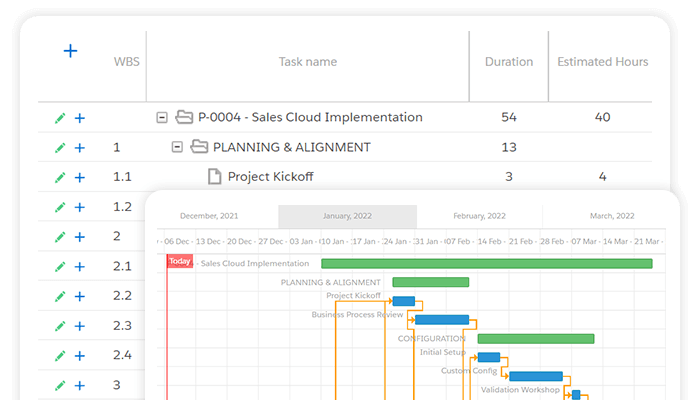
By using a PSA platform, teams can communicate more effectively and efficiently. They can track and manage their tasks, allocate resources appropriately, and ensure billing and invoicing processes are accurate and up to date.
This helps to ensure the project is completed on time and on budget.
Benefits of PSA
- Better Project Management: With features like Gantt charts and Kanban boards, PSAs make it easier for teams to plan projects effectively from start to finish.
- Increase Resource Utilization: By providing insights into available resources and their skill sets, PSAs enable managers to allocate tasks more efficiently based on expertise or availability.
- Faster Billing & Invoicing: Automated billing processes reduce manual efforts while ensuring accurate invoices are sent out promptly after work completion.
- Closer Collaboration: With real-time updates on project progress shared across departments through built-in messaging systems or integrations with popular communication platforms like Slack or Microsoft Teams.
- Close the gap between sales and delivery: When running your entire business on a single platform, you can close more deals and delivery higher-quality projects.
Examples of PSA Software
The market offers several leading PSA solutions catering specifically to different industries within the professional services sector. Some examples include:
- Klient: A native Salesforce PSA platform designed for professional services businesses to manage tasks, deadlines, finances, and team communication efficiently.
- Productive: An all-in-one software to manage professional services, specifically agencies, including sales and reporting. Productive is a standalone platform that doesn’t integrate with Salesforce without using third-party tools.
- Projector PSA: A cloud-based solution that offers robust features like time tracking, expense management, and revenue forecasting tailored to professional services firms. While it integrates with Salesforce, it isn’t native to it.
PSAs are a powerful tool that can help professional services businesses streamline their processes and improve efficiency. You can determine which ERP or PSA solution is most advantageous for your business by examining the differences and similarities between the two.
Request A Custom Demo With Klient PSA
Comparing ERP and PSA
Professional services businesses need to understand the differences and similarities between Enterprise Resource Planning (ERP) and Professional Services Automation (PSA) systems. The purpose of this section is to help decision-makers in professional services businesses determine which solution is most appropriate for their organization.
Similarities between ERP and PSA
- Data Integration: Both ERP and PSA systems aim to integrate various business processes into a single platform, streamlining data management across departments.
- Better Decision-Making: By providing real-time insights into business performance, both solutions help managers make informed decisions that drive growth.
- Increase Efficiency: Implementing either an ERP or PSA system can lead to improved efficiency by automating manual tasks, reducing errors, and saving time on administrative work.
- Cross-Functional Collaboration: Both types of software facilitate collaboration among team members from different departments through centralized communication tools like chat features or shared task boards.
Differences between ERP and PSA
- Purpose & Focus: An important distinction lies in their primary focus areas. While ERPs cater to companies with diverse operations such as manufacturing or distribution, PSAs are specifically designed for professional service organizations looking to optimize project delivery (source).
- Customization : Due to their broader scope, ERPs tend to be more generic, requiring extensive customization for specific industries. On the other hand, PSAs are tailored to meet the unique needs of professional services businesses out – of – the – box.
- Implementation Time & Cost: Generally, ERP systems have longer implementation times and higher costs compared to PSA solutions due to their complexity and need for customization. In contrast, PSA platforms like Klient can be implemented faster with a lower upfront investment. ADD A SECTION HERE ONCE WE HAVE A POST FOR KLIENT UNIVERSITY FOR ONE OF THE LATEST PEOPLE!
- User Experience: As ERPs cater to various industries, they may not provide an intuitive user experience for service-based organizations. Conversely, PSAs focus on delivering seamless experiences tailored specifically for professional services firms.
In short, PSAs are designed to make day-to-day operations easier and more efficient. They are focused on improving productivity and streamlining processes so users can get work done faster.
This translates into a more enjoyable and productive work environment. On the other hand, ERPs are designed to help organizations gain better visibility, control, and accuracy over their operations.
Choosing the Right Solution for Your Business Needs
It can be challenging to choose between an ERP and a PSA solution when your business’s unique needs and goals are taken into consideration. In order to evaluate the appropriateness of different business solutions, you need to examine your requirements, weigh options, and consider both their benefits and disadvantages.
Let’s get into it!
Assessing Your Business Requirements
To determine which system best suits your professional services business, start by identifying your organization’s specific needs. Consider factors such as:
- The size of your company
- Your industry sector
- The complexity of the projects you manage
- Your team collaboration requirements
- Budget constraints or preferences on pricing models (e.g., subscription-based vs one-time purchase)
You may also have other needs to consider. Make sure to look at your organization as a whole instead of only considering separate departments or teams.
Evaluating Available Solutions
Find candidates that meet your criteria for ERP and PSA solutions once you have a clear understanding of what you need.
Analyze the features offered by different systems by focusing on how they address pain points specific to professional services businesses.
For example, if members of your team log billable hours, the solution you pick should allow your team members to choose between billable and non-billable hours when entering their timesheets.
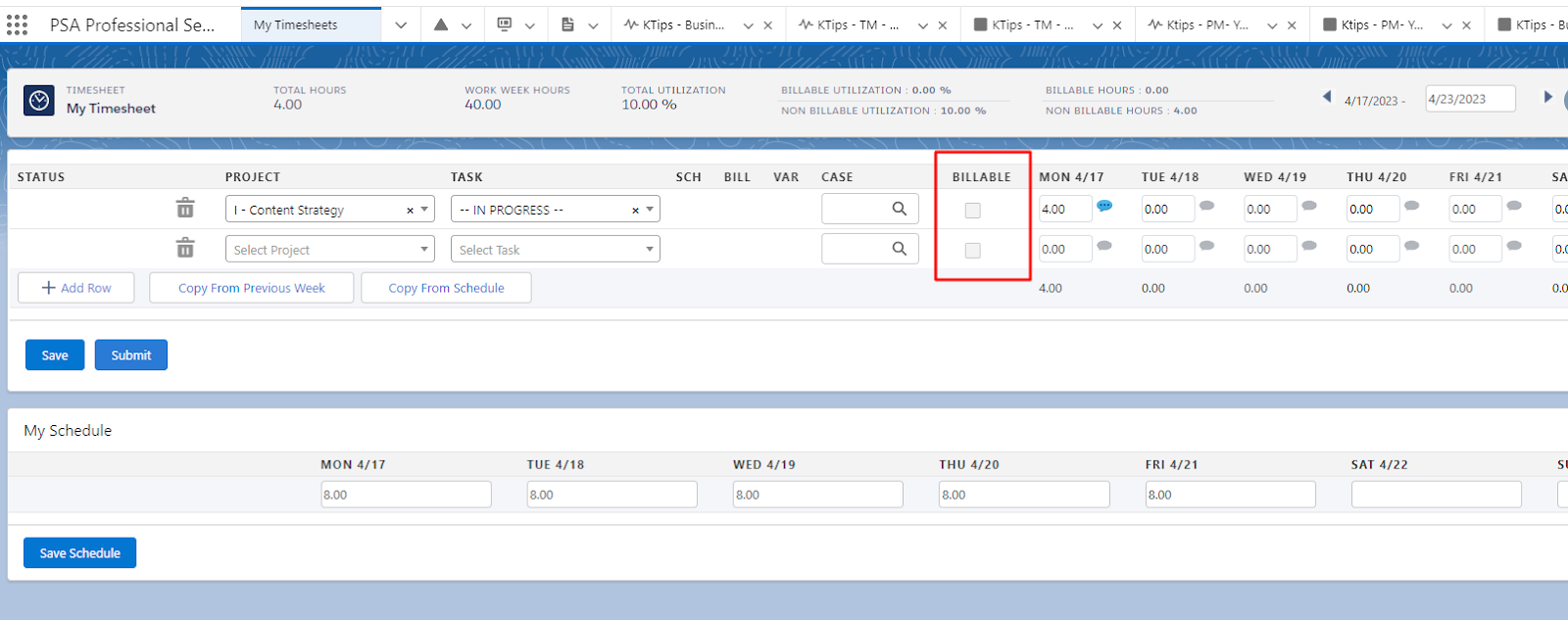
Here’s another example — let’s say you run a SaaS business with a professional services department. This department needs a solution to onboard customers faster without anyone falling through the cracks.
Let’s also say the rest of your company uses Salesforce to manage customer data and automate marketing. It would make much more sense to choose an ERP or PSA that’s built directly into the Salesforce ecosystem.
Otherwise, your professional services team will operate on an entirely different platform. This can lead to silos, confusion, and lack of efficiency.
By choosing a Salesforce-integrated platform, you ensure your team works with the same data and technology, resulting in better collaboration and communication.
c. Making an Informed Decision
When comparing potential solutions based on their capabilities relevant to addressing identified challenges within your organization, consider the following:
- Analyze any discrepancies between the two types of systems and their compatibility with your existing operations and scalability for future expansion.
- Consider the ease of integration with your existing systems and processes.
- Evaluate the scalability of each solution to accommodate future growth or changes in your business needs.
- Factor in any additional costs, such as implementation, training, and ongoing support services.
Remember that selecting the right software can significantly impact productivity, efficiency, and overall success – so invest time in making a well-informed choice.
How To Choose The Best PSA For Your Organization
If you’ve decided to opt for a PSA instead of an ERP, here’s what to keep in mind:
Pick a platform that integrates with (or is native to) the environment you already use. If the rest of your organization is already on Salesforce, it only makes sense to choose a PSA that’s native to Salesforce!
Otherwise, the PSA solution should fit your business goals. Nearly all PSA tools share similar features, but they’re not all built for the same types of businesses.
For instance, Klient is ideal for consulting firms, SaaS companies, and Salesforce partners with up to 200 employees.
Frequently Asked Questions About Erp vs Psa
What is the difference between PSA and ERP?
The main difference between PSA (Professional Services Automation) and ERP (Enterprise Resource Planning) lies in their focus. While PSA software is designed specifically for professional services businesses to manage projects, resources, and finances, ERP systems cater to a broader range of industries with functionalities like supply chain management, manufacturing planning, and financial management.
What is PSA in an ERP system?
PSA in an ERP system refers to the integration of Professional Services Automation features within an Enterprise Resource Planning solution. This allows organizations to streamline their project management processes while also benefiting from other core functions provided by the integrated platform such as finance or inventory control.
How would you compare an accounting information system with an enterprise resource planning system?
An Accounting Information System (AIS) focuses on managing financial transactions and generating reports for decision-making purposes. On the other hand, Enterprise Resource Planning (ERP) systems offer a more comprehensive suite of tools that include not only accounting but also operations management, human resources, procurement & logistics among others.
What are three disadvantages of ERP systems in an organization?
- High implementation costs: ERP systems can be expensive due to licensing fees and customization requirements.
- Complexity: These solutions can be difficult to implement and require extensive training for employees.
- Rigidity: ERP systems may not always adapt well to unique business processes, leading to a lack of flexibility.
Wrapping It Up — Have Fun Growing Your Business With Klient PSA
While ERP is more focused on financial management, PSA offers a comprehensive set of tools for streamlining operations and automating processes.
Ultimately the decision between ERP vs PSA depends on your business needs; if you require advanced automation capabilities then PSA may be the better option for you.
If you’re looking for a way to manage your professional services projects from start to finish on Salesforce, Klient PSA is the platform for you.
And no, you don’t need a Salesforce license to start using Klient PSA!
Book a free demo to start scaling your business fast:

You liked this Klient Tip? Share it with your team!
Discover more articles from Klient

Replace all your tools with Klient, Salesforce #1 PSA platform
Run your entire SaaS and consulting business on a single professional service automation platform native to Salesforce!

